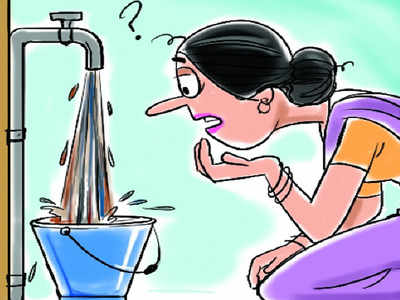The New Indian Express 23.03.2013
BWSSB rises to save water

Every day, on an average 34 per cent of drinking water is wasted
because of pipeline leakage, its infrastructure and rising cases of
water thefts in Bangalore. In a city which is already facing water
crunch, is it viable or can we afford to waste so much of water is the
question asked by many. On the occasion of World Water Day, BWSSB chief
engineer (Cauvery project) Narayana spoke exclusively to City Express on
the future plans to conserve water for both the environment and future
generations.
After the launch of project, ‘unaccounted water
flow’ in south division, BWSSB is hoping to expand the project to
central and west division. Narayana said, “Tenders have been called and
work will soon begin in these two divisions as well.”
As for
south division, the work has been tendered to a private firm at a cost
of Rs 173 crores and work is under process. Currently, there are one
lakh five thousand household connections in south division and leaking
pipelines and faulty metres have been the major contributor of water
wastage.
Narayana adds, “We will be replacing 140-145 km of
leaking pipelines which are 4 inches and above. Besides, faulty metres
also plays a major role in water leakage. Initially, a survey will be
conducted in the entire area and it will be divided into 80 to 90
district meter areas. First the bulk metres will be fixed. The board
will install boundary valves, step valves, replace defective valves and
faulty meters and install pressure and flow monitoring points in order
to check the leakage; finally installing electronic district meters to a
central system of checking. The difference of consumption will be
monitored on a daily basis and that’s how we will be able to bring down
the leakage from 34 per cent to 16 per cent. Even if we can bring it to
20 per cent, it will be a great achievement.” Moreover, illegal and
unauthorised metres will also be identified and owners will be
penalised.
Interestingly, if the leakage comes down to 16 per cent
or 20 per cent, BWSSB will get the pay back of the money invested, in
four and half years. What is more interesting is the fact that BWSSB
will give incentives to the firm if the leakage comes below 26 per cent.
The project will continue for six years. As for central division, the
budget estimated is Rs 100 crores and for the west division, it is Rs
155 crores.
There has been a lot of criticism that BWSSB has been
facing for untreated sewage water. Currently, BWSSB has 14 sewage water
treatment plant and under the Japan International Cooperation Agency
(JICA) project, seven more sewage treatment plant will be constructed.
The
treated water is let out in the open spaces of Bangalore. Commenting on
the drive, Narayana said, “There is lot of skepticism among the people
of Bangalore to use sewage treated water for portable and non portable
purposes. This will eventually happen, but we have a long way to go.”

